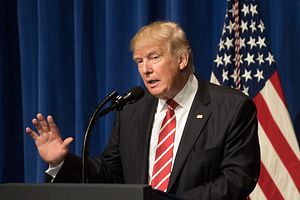One year ago, in a piece for The Diplomat, I made the argument that China and Russia’s attempts to balance against the United States had backfired: “they are not leading to multipolarity, but are actually reinforcing unipolarity.” The thesis was that China and Russia’s efforts to balance against the United States were focused on “regional revisionism” (or attempts to forcefully alter the regional political, territorial, and military status quo), which had catalyzed regional responses to contain them by strengthening the U.S. led alliance systems in Europe and East Asia, thereby reinforcing U.S. global hegemony. Hence, the piece predicted a long “unipolar moment” of U.S. hegemony. How has this argument fared over the past year?
Throughout the latter half of 2016, a number of events took the world by surprise and seemed to call into question the thesis of enduring U.S. hegemony, based on the systemic tendencies of international politics. These unit-level “wildcards” included Great Britain’s referendum decision to leave the European Union (i.e., the “Brexit”), the growing popularity of nationalist parties in Europe (e.g., Marine Le Pen in France), the emergence of populist leaders with anti-American sentiments in East Asia (e.g., President Duterte in the Philippines), and, of course, the election of Donald Trump as president of the United States. The beginning of 2017 appeared to give strength to the counter-thesis of the “coming end” of not only unipolarity, but the international liberal order. There was a widespread expectation that President Trump might confront China, cuddle-up to Russia, and leave U.S. alliances in Europe and East Asia to wither on the vine.
Such predictions rest on what is often a poor assumption in international politics: that outcomes follow from intentions. This assumption has its roots in the reductionist logic that a system can be sufficiently understood by examining its parts — or that patterns of strategic behavior, interactions, and outcomes in international politics can be extrapolated from the intentions and power of individuals states. It is certainly true that in a unipolar system, the sole great power (i.e., the United States) possesses significant capabilities to influence other states and to produce system-wide effects. For this reason, my own initial analysis of Trump’s foreign policy was critical of its lack of prudence and moderation. However, the actual events and outcomes of international politics are a constant reminder of Kenneth Waltz’s central insight that the international system shapes and constrains the behavior and interactions of states, including the great powers like the United States.
During the first “100 days” of the Trump administration, U.S. foreign policy has changed in important ways — such as on free trade and climate change (e.g., the abandonment of the Trans-Pacific Partnership); a more blatant use of military force in the Middle East (including a major cruise missile strike against a Syrian airfield, and the dropping of the so-called “mother of all bombs” in Afghanistan); and heightened tensions with Iran and North Korea, with there being a real danger of renewed war on the Korean Peninsula. Yet there has also been remarkable consistency in a number of strategic areas.
Firstly, the United States and Russia continue to oppose each other in their policies towards Ukraine and Syria, and the prospects of a general improvement of U.S. and Russian strategic relations appears unlikely. The reason is structural: the United States represents the major roadblock to Russia’s aspiration of becoming (again) a great power. This basic reality of unipolarity is unaffected by whether Trump or Hillary Clinton would be the president of the United States.
Secondly, the United States and China remain in limbo between coordination and competition, but so far remaining free from outright conflict. Much was made of Trump’s break of diplomatic protocol when he accepted a phone call from Taiwanese President Tsai Ing-wen. However, Trump has since publicly affirmed the United States’ commitment to the one China policy, has refrained from labeling China a currency manipulator, and has been in close contact with Chinese President Xi Jinping over North Korea. Nevertheless, China’s growing military power and foreign policy ambitions suggest that a U.S.-China geopolitical rivalry will continue, despite their mutual recognition of the managerial need for issue-based policy coordination.
Thirdly, the U.S. alliance system in both Europe and East Asia continues to be a pillar of U.S. foreign policy. U.S. policy on NATO, demonstrated by a February “ultimatum” from Defense Secretary James Mattis (in reality a firm defender of NATO), has been one of demanding increased defense spending from its allies while affirming the United States’ commitment to collective defense. The Trump administration has also signaled its continued security guarantees to Japan and South Korea, with both Defense Secretary Mattis and Secretary of State, Rex Tillerson, making trips to Japan and South Korea, and Japanese Prime Minister Shinzo Abe making a trip to Washington, D.C. Even the Philippines’s President Duterte has appeared more willing to work with Trump than with Barack Obama, which bodes well for the U.S.-Philippines alliance.
Overall, the events of 2017 to date are a reminder of how the structure of the international system, in Waltz’s words, “shapes and shoves” states in their behaviors and interactions, and produces predictable patterns of outcomes in international politics. In the contemporary unipolar world, the international system continues to be shaped primarily by the logic of U.S. hegemony. Thus, the argument I made a year ago continues to look pretty good: the U.S. alliance system remains intact and represents a significant systemic constraint against the emergence of new great powers. This continuity is good news for those who worry about a Trump presidency, but bad news for those would-be great powers, China and Russia.
Nathan A. Sears is a PhD Student in Political Science at The University of Toronto. His research focuses on international relations theory, international security, and strategic studies.

































